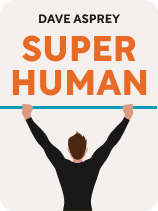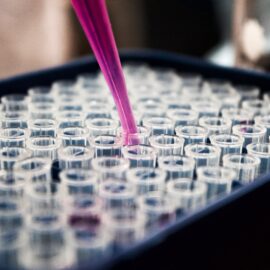

This article is an excerpt from the Shortform book guide to "Super Human" by Dave Asprey. Shortform has the world's best summaries and analyses of books you should be reading.
Like this article? Sign up for a free trial here.
How can you naturally reduce inflammation in your body? What’s the best way to rebalance your gut bacteria? Is it possible to reverse hormonal imbalances?
In the Super Human book, Dave Asprey draws on advancements in anti-aging science to explore ways to slow down and reverse the aging process, optimize your mental and physical health, and extend your lifespan. He shares practical advice on how to keep your body young.
Continue reading for an overview of Super Human by Dave Asprey.
Super Human by Dave Asprey
Most people believe that mental and physical deterioration go hand in hand with aging. They assume that, with every year that passes, they’ll look and feel older, suffer more aches and pains, and become more susceptible to debilitating diseases that nudge them closer to death. In the Super Human book, Dave Asprey argues that you can grow older in years and extend your lifespan without suffering these ill effects.
(Shortform note: In the same vein, biologist and geneticist David Sinclair (Lifespan) argues that aging is a disease that we should attempt to overcome and that age-related deterioration doesn’t have to be an inevitable consequence of growing old. He predicts that anti-aging medicines and technologies will eventually increase our lifespan and years of health until we no longer have a maximum lifespan—meaning that we’ll stay young and healthy forever.)
Asprey argues that age-related deterioration doesn’t result from getting older in years, but from getting older biologically. According to him, your biological age doesn’t mirror your chronological age. Rather, it mirrors the health of your cells: The healthier your cells, the more efficiently your body can protect your overall health. This decreases your biological age, makes you feel more youthful, and prolongs your lifespan. On the other hand, unhealthy cells prevent your body from maintaining your health. This increases your biological age, makes you feel older, and reduces your lifespan.
This guide explores Asprey’s thoughts on cellular health and biological aging in two parts:
- In Part 1, we’ll explore the role your cells’ mitochondria play in managing cellular health and how their effectiveness impacts your overall health and biological age.
- In Part 2, we’ll outline the factors that cause mitochondrial inefficiency and present Asprey’s solutions for overcoming them, optimizing cellular health, and decelerating biological aging.
Part 1: Inefficient Mitochondria Accelerate Biological Aging
Asprey argues that mitochondrial efficiency plays a key role in biological aging.
Principle #1: Mitochondria Manage Cellular Health
According to Asprey, mitochondria—tiny organelles that live within your cells—manage cellular health and functionality through a number of processes. Asprey argues that, the more efficiently your mitochondria manage these processes, the better your cells are at maintaining your mental and physical health.
Principle #2: Inefficient Mitochondria Damage Your Cells
According to Asprey, when extracting energy from your body’s metabolic processes, mitochondria create two by-products: free radicals and antioxidants.
When your mitochondria function efficiently, they create sufficient antioxidants to counteract the damaging effects of free radicals. Inefficient mitochondria are unable to produce enough antioxidants to defend your cells against free radicals—resulting in cellular damage.
Asprey explains that, when excess free radicals damage your cells, they inhibit a key mitochondrial process—removing dysfunctional cells from your body. These dysfunctional cells linger in your system, secreting inflammatory proteins that accumulate in your body and cause chronic inflammation. According to Asprey, chronic inflammation makes you more susceptible to diseases.
Principle #3: Mitochondrial Efficiency Determines Your Biological Age
Asprey argues that the key to living a long and youthful life is to ensure that mitochondria work efficiently enough to optimize cellular health. This is because efficient mitochondria decelerate biological aging. On the other hand, inefficient mitochondria accelerate biological aging.
Part 2: Improve Mitochondrial Efficiency and Decelerate Biological Aging
Inefficient mitochondria initiate a cycle that accelerates biological aging. According to Asprey, there are six factors that contribute to this damaging cycle, which we’ll discuss next. Fortunately, according to Asprey, it’s possible to overcome each of these factors and replace a damaging cycle with a more rejuvenating one.
Factor 1: Inflammatory Foods
Asprey explains that the food you eat directly impacts the amount of inflammation in your body. According to Asprey, foods that cause inflammation include wheat, grains, gluten, sugar, charred meat, fried foods, and crops sprayed with herbicides that contain glyphosate. Asprey suggests that, in addition to eliminating inflammatory foods, you can reduce inflammation in your body by implementing four dietary changes, which we’ll discuss next.
Dietary Change #1: Consume Antioxidant-Rich Foods
Consuming antioxidant-rich foods will support your mitochondria in reducing the number of free radicals and damaged cells in your body. According to Asprey, good sources of antioxidants include coffee, tea, berries, herbs, spices, and dark chocolate. Additionally, he suggests that you can eliminate excess free radicals from your body by taking antioxidant supplements.
Dietary Change #2: Replace Trans Fats With Omega-3 Fats
Fats are essential for cellular health because they help form the protective lining of your cells. However, trans fats don’t provide the necessary nutrients to form healthy cell linings. According to Asprey, omega-3 fats (found in foods such as olive oil, walnuts, and cold-water fish) are anti-inflammatory and provide the necessary nutrients to form healthy cell linings.
Dietary Change #3: Balance Your Protein Intake
Asprey explains that protein is essential for cellular health because it helps repair tissues and maintain muscle mass. However, consuming excess protein creates a surplus of cellular waste that clogs up your cells, overloads your mitochondria, and causes further cellular damage.
Asprey recommends eating 0.5 grams of protein a day for every pound you weigh (reduce this figure down to 0.35 grams if you’re overweight). According to him, good sources of protein include wild fish, hemp, and products derived from grass-fed animals. He also suggests that you supplement your daily protein intake with 20 grams of collagen powder.
Dietary Change #4: Metabolize Glucose and Ketones
Asprey explains that the energy mitochondria extract from your body’s metabolic processes takes one of two forms—glucose or ketones—depending on how much sugar there is in your bloodstream for your body to metabolize. According to Asprey, mitochondria work more efficiently when they’re able to switch between extracting glucose and ketones to power your cells.
Asprey recommends two dietary approaches that will adjust your blood sugar levels to produce both glucose and ketones:
- Restrict what you eat by following a ketogenic diet for five or six days a week. Then, for one or two days a week, add 150 grams of low-sugar carbohydrates, which will release sugar into your bloodstream and help your body produce glucose.
- Restrict when you eat by practicing intermittent fasting. This involves limiting your food intake to one six-to-eight-hour period each day.
(Shortform note: While Johns Hopkins Medicine supports the finding that intermittent fasting can help control blood sugar levels, they advise that the following people shouldn’t attempt it: anyone under the age of 18, people who are pregnant or breastfeeding, and those who suffer from metabolic or eating disorders. If you do intend to practice intermittent fasting, they recommend that you stay hydrated—by drinking water or other zero-calorie drinks (such as black tea or coffee) during your fasting periods.)
Factor 2: Imbalanced Gut Bacteria
When your gut bacteria are out of balance, your gut lining breaks down, fails to absorb nutrients, and leaks toxins into your bloodstream. Asprey suggests two methods for rebalancing gut bacteria:
- Add more fiber to your diet. He suggests that you can maximize your production of healthy gut bacteria by eating lots of fibrous vegetables and consuming 10 to 30 grams of powdered fiber each day.
- Reduce your exposure to antibacterial products and replace antibiotics with ozone therapy—a treatment that administers ozone gas directly into your body to aid self-healing.
(Shortform note: While some doctors agree that reducing exposure to antibacterial products and antibiotics promotes healthy gut bacteria, they express concerns. The Food and Drug Administration (FDA) has yet to authorize or regulate it. However, it has issued a warning against using ozone therapy.)
Factor 3: Excess Metals in Your Body
Asprey explains that the energy-extraction process mitochondria use to power your cells is an electrical process. Since metals have high electrical conductivity properties, having too many of them in your body interferes with this energy-extraction process and often results in mitochondrial dysfunction and mitochondrial death.
According to Asprey, you’re more likely to have excess metals in your body if you eat food derived from crops planted in thallium-rich soil, consume high quantities of oceanic fish, have dental fillings, or spend a substantial amount of time under fluorescent lighting.
In addition to avoiding exposure to excess metals, Asprey suggests that you can detox your body of existing metals by consuming binding agents such as glutathione or activated charcoal. But, he recommends that you seek medical advice before consuming them.
Factor 4: Sleep Deprivation
According to Asprey, sleep deprivation results from missing out on good-quality sleep that maximizes your time in deep sleep (otherwise known as “delta sleep”). Asprey suggests that you can improve the quality of your sleep by making two lifestyle changes:
- Adapt your lighting. Asprey explains that you’re more likely to suffer from sleep deprivation if you’re regularly exposed to blue light from LED bulbs and screens. Asprey suggests replacing the lighting in your environment with red bulbs, turning off all screens and dimming your lights two hours before you plan to sleep, and wearing glasses that filter out blue light. He also recommends that you spend ten to twenty minutes in the sun each morning.
- Track your sleeping patterns. Asprey recommends using a sleep tracker that also gathers data from your daytime activities. This type of tracker will reveal how your daytime activities impact the quality of your sleep.
Factor 5: Hormonal Imbalances
Asprey argues that hormones play a key part in how well mitochondria function because they help maintain your overall health (thereby reducing the damaged and dysfunctional cells mitochondria must deal with). Asprey suggests four methods that can help you prevent or reverse hormonal imbalances:
- Practice high-intensity exercises a few times a week.
- Replace chemical-laden products with natural ones.
- Check the effects of any prescription medications.
- Find replacements for hormonal birth control.
If changing your lifestyle doesn’t help to rebalance your hormones, Asprey recommends undertaking bioidentical hormone replacement therapy (BHRT).
Factor 6: Stem Cell Deficiencies
Mitochondria rely on stem cells to initiate the creation of all healthy replacement cells. As you age, your stem cell reserves dwindle. This causes tissues throughout your body to lose more cells than they can replace. According to Asprey, this tissue loss is a prime cause of age-related deterioration.
Asprey suggests that you can increase your stem cell count and prevent tissue damage by undertaking stem cell treatments. Asprey also recommends freezing healthy stem cells when you’re young so that you can benefit from them when you’re older.

———End of Preview———
Like what you just read? Read the rest of the world's best book summary and analysis of Dave Asprey's "Super Human" at Shortform.
Here's what you'll find in our full Super Human summary:
- How to grow older without the negative side effects
- A look into the advancements of anti-aging science
- Why a healthy future starts with making changes now






